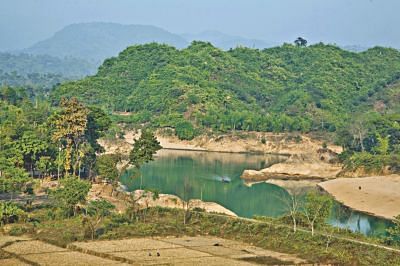At <i>Lalakhal</i>

View from the observation tower. Photo: Ihtisham Kabir
North of Sylhet close to the border with India, several rivers flow south from the Khasia-Jaintia Hills to the Bangladesh plains, washing down minerals, boulders, pebbles and stones from the hills. One such river is the Shari, whose water is a breathtaking blue. Just after flowing into Bangladesh, the Shari passes through a beautiful area called Lalakhal.
At Lalakhal, one bank of the Shari has tea gardens while a Border Guard camp and the Nazimgarh Wilderness Resort are on the opposite bank. The river sees much commercial activity: stones of all sizes are collected by boat and supplied to the nation's construction industry. But the water remains blue all the way downstream.
To get to Lalakhal, you travel thirty kilometres from Sylhet on the Tamabil highway. Near Jaintia, where there is a half-sunken old house in the middle of the road, you turn right into a smaller road which takes you through picturesque countryside. Vegetable fields with lonely scarecrows watching over them dot the strip of land between road and river. Soon you are running parallel to the river watching the misty blue hills rising in the distant horizon.
Nazimgarh Wilderness Resort is at the end of this road. I chose to drive there; one could also take a boat from Shari Ghat (on the Tamabil highway) and cruise for 45 minutes. The recently completed resort sits atop a hill surrounded by lush greenery. Its forty rooms are decorated tastefully with a tropical theme. The highlight is an extraordinary tree-top suite where you can look out your window during the rainy season and watch a mountain stream flowing fifty feet under your feet. From the resort's observation tower I was able to enjoy a 360-degree view of the surroundings including the beautiful river.
Downhill from the Resort - on the riverbank - is the River Queen restaurant and a tent-resort called Nazimgarh Nature Park.
It was early morning when I arrived for my boat ride. Riverine activity was slow at this hour. As I waited for my boat a sprightly black and white bird flew low across the river and landed on the stony bank. The white wagtail (choto khanjan) impatiently searched for worms on the bank before taking off across the river again.
My boat travelled up the river, getting close to Zero Point – where Bangladesh ends and India begins – before turning around. The blue river, distant hills and greenery made for an enchanting trip. During my return I took a break to explore Lalakhal Tea Garden. After walking uphill from the ghat I found myself face-to-face with an ancient banyan tree. Nearby, a silk cotton (shimul) tree had bloomed early much to the excitement of a group of chestnut-tailed starlings (kath-shalik) which busily ate nectar from its crimson flowers.
I left Lalakhal with the distinct impression of having found a special place which will become a popular destination for domestic and foreign tourists in coming days. Moreover, I realise that Lalakhal is more than a place: it is a sublime state of mind.

 For all latest news, follow The Daily Star's Google News channel.
For all latest news, follow The Daily Star's Google News channel. 



Comments